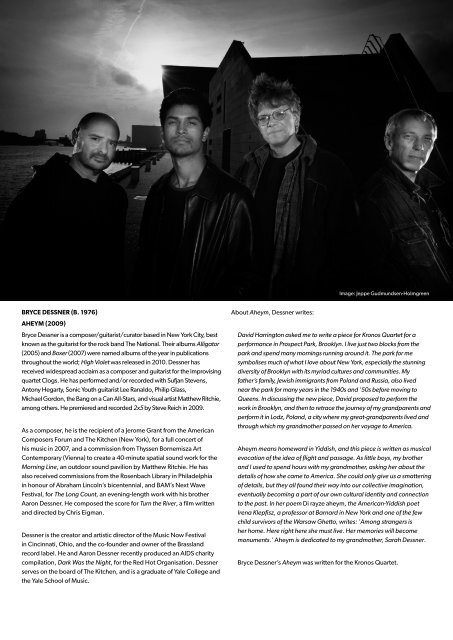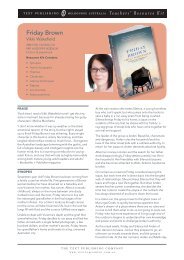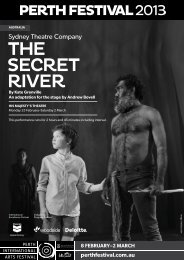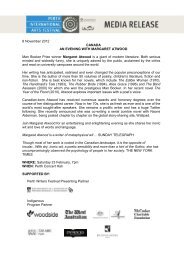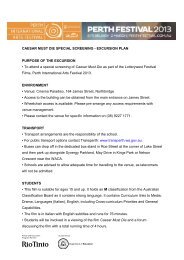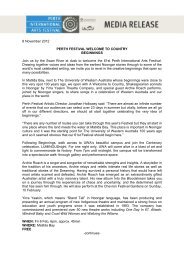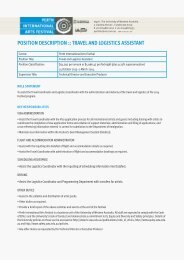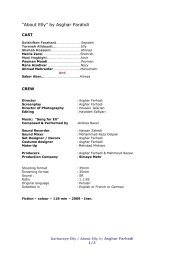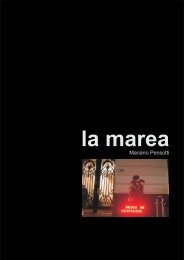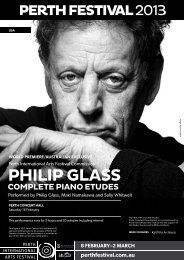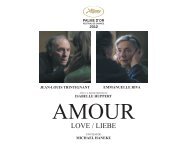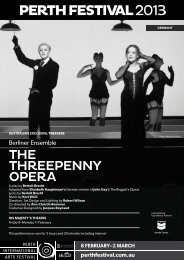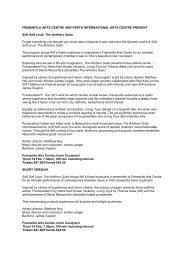kronos quartet
kronos quartet
kronos quartet
Create successful ePaper yourself
Turn your PDF publications into a flip-book with our unique Google optimized e-Paper software.
Image: Jeppe Gudmundsen-Holmgreen<br />
Bryce Dessner (b. 1976)<br />
Aheym (2009)<br />
Bryce Dessner is a composer/guitarist/curator based in New York City, best<br />
known as the guitarist for the rock band The National. Their albums Alligator<br />
(2005) and Boxer (2007) were named albums of the year in publications<br />
throughout the world; High Violet was released in 2010. Dessner has<br />
received widespread acclaim as a composer and guitarist for the improvising<br />
<strong>quartet</strong> Clogs. He has performed and/or recorded with Sufjan Stevens,<br />
Antony Hegarty, Sonic Youth guitarist Lee Ranaldo, Philip Glass,<br />
Michael Gordon, the Bang on a Can All-Stars, and visual artist Matthew Ritchie,<br />
among others. He premiered and recorded 2x5 by Steve Reich in 2009.<br />
As a composer, he is the recipient of a Jerome Grant from the American<br />
Composers Forum and The Kitchen (New York), for a full concert of<br />
his music in 2007, and a commission from Thyssen Bornemisza Art<br />
Contemporary (Vienna) to create a 40-minute spatial sound work for the<br />
Morning Line, an outdoor sound pavilion by Matthew Ritchie. He has<br />
also received commissions from the Rosenbach Library in Philadelphia<br />
in honour of Abraham Lincoln’s bicentennial, and BAM’s Next Wave<br />
Festival, for The Long Count, an evening-length work with his brother<br />
Aaron Dessner. He composed the score for Turn the River, a film written<br />
and directed by Chris Eigman.<br />
Dessner is the creator and artistic director of the Music Now Festival<br />
in Cincinnati, Ohio, and the co-founder and owner of the Brassland<br />
record label. He and Aaron Dessner recently produced an AIDS charity<br />
compilation, Dark Was the Night, for the Red Hot Organisation. Dessner<br />
serves on the board of The Kitchen, and is a graduate of Yale College and<br />
the Yale School of Music.<br />
About Aheym, Dessner writes:<br />
David Harrington asked me to write a piece for Kronos Quartet for a<br />
performance in Prospect Park, Brooklyn. I live just two blocks from the<br />
park and spend many mornings running around it. The park for me<br />
symbolises much of what I love about New York, especially the stunning<br />
diversity of Brooklyn with its myriad cultures and communities. My<br />
father’s family, Jewish immigrants from Poland and Russia, also lived<br />
near the park for many years in the 1940s and ’50s before moving to<br />
Queens. In discussing the new piece, David proposed to perform the<br />
work in Brooklyn, and then to retrace the journey of my grandparents and<br />
perform it in Lodz, Poland, a city where my great-grandparents lived and<br />
through which my grandmother passed on her voyage to America.<br />
Aheym means homeward in Yiddish, and this piece is written as musical<br />
evocation of the idea of flight and passage. As little boys, my brother<br />
and I used to spend hours with my grandmother, asking her about the<br />
details of how she came to America. She could only give us a smattering<br />
of details, but they all found their way into our collective imagination,<br />
eventually becoming a part of our own cultural identity and connection<br />
to the past. In her poem Di rayze aheym, the American-Yiddish poet<br />
Irena Klepfisz, a professor at Barnard in New York and one of the few<br />
child survivors of the Warsaw Ghetto, writes: 'Among strangers is<br />
her home. Here right here she must live. Her memories will become<br />
monuments.' Aheym is dedicated to my grandmother, Sarah Dessner.<br />
Bryce Dessner’s Aheym was written for the Kronos Quartet.


